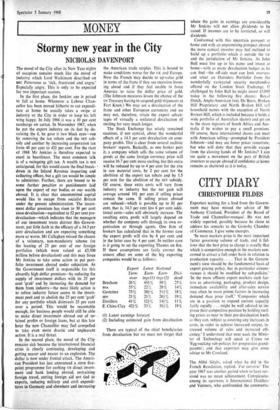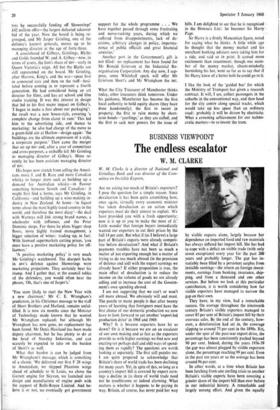CITY DIARY
CHRISTOPHER FILDES
Exporters waiting for a lead from the Govern- ment may have missed the advice of Mr Anthony Crosland, President of the Board of Trade and Chancellor-manqué. He was not widely reported, possibly because he chose to address his remarks to the Grimsby Chamber of Commerce. I give some excerpts.
In most markets price is the most important factor governing volume of trade, and it fol- lows that the best price to charge is usually that which is competitive enough in the markets con- cerned to attract a full order book in relation to production capacity. . . . That in the Govern- ment's view should be the fundamental basis of export pricing policy, but in particular circum- stances it should be modified by sub-policies.' `In the more affluent export markets such fac- tors as advertising, packaging, product design, immediate availability and after-sales service may often be more potent factors in increasing demand than price itself.' Companies which are in a position to expand current capacity fairly rapidly . . . might be well advised to im- prove their competitive position by holding sterl- ing prices as near to their pre-devaluation levels as they can, subject to covering any increases in costs, in order to achieve increased output, in- creased volume of sales and increased effi- ciency.' I understand that next week the Minis- ter of Technology will speak at Crewe on 'Egg-sucking sub-policies for progressive grand- parents'; and that exporters may give some advice to Mr Crosland.
The Abb6 Si6yes, asked what he did in the French Revolution, replied, Teri survecu.' The year 1967 was another period when to have sur- vived was no mean achievement. Conspicuous among its survivors is International Distillers and Vintners, who confounded the commenta-
tors by successfully fending off Showerings'. £42 million offer—the largest defeated takeover bid of the year. Now the board is being re- grouped, and Mr Jasper Grinling, one of the defence's keenest generals, moves up to be managing director at the age of forty-three.
A cousinhood of Gilbeys, Grinlings, Blyths and Golds founded W. and A. Gilbey—now, in terms of assets, the lion's share of mv—early in Queen Victoria's reign. All but the Blyths are still represented on the board. Mr Grinling, after Harrow, King's, and the war—spent first in armoured cars and then on the staff—hesi- tated before coming in to represent a fourth generation. He had considered being an art director for films, and has art school and film studio training. It was this interest in design that led to his first major impact on Gilbey's. `I began to make a fuss about our packaging': the result was a new house-style, covering 'a complete change from claret to rum.' This led him to the advertising side, and thence to marketing: he also had charge of the move to a green-field site at Harlow—design again: 'the buildings are the ultimate expression of a style, a corporate purpose.' Then came the merger that set up Inv and, after a year of committees and cross-purposes, a reshuffle left Mr Grinling as managing director of Gilbey's. More re- cently he has been assistant managing director Of IDV.
His hopes now stretch from selling the Ameri- cans more J. and B. Rare and more Canadian whisky to longer shots such as building up a demand for Australian whisky—in flavour something between Scotch and Canadian : it might first find a home, says Mr Grinling, in California—and building up a wine-making in- dustry in New Zealand. At home-1n liquor terms about the most highly taxed country in the world, and therefore the most dicey'—the deal with Watneys will link strong brand names, a wholesaler with influence, and the Peter Dominic shops. For these he plans bigger shop floors, more highly trained management, a bigger selection of wines : trading up, in fact. With licensed supermarkets cutting prices, 'you must have a positive marketing policy for off- licences.'
'A positive marketing policy' is very much Mr Grinling's watchword. The sharpest barbs in IDV's defence against Showerings were marketing projections. They certainly bear his stamp. And I gather that, at the council tables of the defenders, you would often hear the phrase, 'Oh, that's one of Jasper's.'
`You seem likely to start the New Year with a new chairman.' Mr C. E. Wrangham's prediction, in his Christmas message to the staff of Short Brothers and Harland, remains unful- filled. It is now six months since the Minister of Technology made known that he wanted. Mr Wrangham replaced; but although Mr Wrangham has now gone, no replacement has been found. Mr Denis Haviland has been made deputy chairman, but he has plenty to do at the head of Staveley Industries, and can scarcely be expected to take on the burden of Short's as well.
What that burden is can be judged from Mr Wrangham's message, which is something of a classic. 'We delivered our first F 28 wings to Amsterdam, we shipped Phantom wings ahead of schedule to St Louis, we chose the Garrett engine for Skyvan, we launched into design and manufacture of engine pods with the support of Rolls-Royce Limited. AO be- lieve it or not, we eventually got government support for the whole programme . . . We have together passed through some frustrating and nerve-racking years, during which we suffered from disappointments, lack of de- cisions, arbitrary changes in policy, imperma- nence of public officials and great financial anxieties.'
Another post in the Government's gift is not filled : no replacement has been found for Mr Ronald Grierson at the Industrial Re- organisation Corporation. Any day now, I sup- pose, some Whitehall spark will offer Mr Grierson Short's and Mr Wrangham the mac.
What the City Treasurer of Manchester thinks today, other treasurers think tomorrow. Under his guidance, Manchester has become the first local authority to hold equity shares (they have done handsomely); the first to invest in property; the first to raise money by short- term bonds—`yearlings,' as they are called; and the first to seek new powers for the issue of
bills. I am delighted to see that he is recognised in the Honours List: he becomes Sir. Harry• Page.
Sir Harry is a firmly Mancunian figure, noted for saying what he thinks. A little while ago he • thought that the money market and his merchant banking advisers were taking him for a ride, and said so in print. It caused more excitement than resentment; though one mem- ber of the money market, absent-mindedly burnishing his hat, went so far as to say that if Sir Harry knew of a better hole he could go to it.
I like the look of the 'guided bus' for which the Ministry of Transport has given a research contract. It will, I see, collect passengers in the suburbs in the conventional way, and then head for the city centre along special tracks, which would take up less space than an ordinary road : probably it will be driven by electricity. What a crowning achievement for our techno- cratic masters—to re-invent the tram.



































 Previous page
Previous page